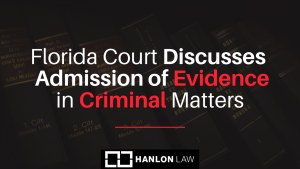
In many criminal cases, the State lacks direct evidence that the defendant committed a crime. Thus, in such instances, the State will rely on circumstantial evidence to build a case against the defendant. While circumstantial evidence is generally admissible, it must bear a connection to either the defendant or the charged offense, and irrelevant evidence that is improperly admitted may lead the jury to issue an unjust verdict. This was shown in a recent Florida case in which the defendant was convicted of multiple crimes due to a glove found in his sister’s van several days after the alleged criminal acts. If you are charged with a crime, it is important to know your rights, and you should speak with a knowledgeable Tampa criminal defense attorney as soon as possible.
The Alleged Crime and Trial
It is reported that two men broke into the home of the victim, held her at gunpoint, and ransacked her house. The victim was then struck in the head with a gun and shot. After the perpetrators left, she went to a nearby salon and called 911. During the course of the investigation of the crime, the defendant was named as a suspect, and the victim identified the defendant as the man who shot her. He was then charged with attempted second-degree murder and numerous other offenses.
Reportedly, there was no direct evidence linking the defendant to the crime. Prior to trial, the defendant moved to suppress evidence of a glove that was found in a van owned by his sister, which was one of the only pieces of evidence that could potentially implicate him. The court denied the motion, and the defendant was found guilty on all charges. He then appealed, arguing in part that the trial court erred in denying his motion to suppress.
Determining if Evidence is Admissible
Under Florida law, any evidence that tends to prove or disprove a material fact will be deemed relevant. While evidence must be relevant to be admissible, relevant evidence may be precluded if the court finds that the dangers of unfair prejudice to the defendant, misleading the jury, and confusing the issues greatly outweighs the probative value of the evidence. Further, the Florida courts have ruled that evidence that bears no connection to the defendant or to the alleged crime is too prejudicial to be admissible.
In the subject case, the defendant argued the admission of evidence of the glove was prejudicial as there was no evidence the glove was used in the crime. The defendant also argued that the trial court’s error in admitting the evidence was prejudicial, as it led to the inference the defendant committed the crimes with which he was charged. The appellate court agreed and vacated the verdict and remanded the case for a new trial.
Speak to a Proficient Tampa Attorney Regarding Your Charges
The State is limited as to what evidence it may produce at trial, in that it cannot introduce evidence that is prejudicial and irrelevant. If you are charged with a crime, it is important to speak to an attorney regarding what evidence may be used against you. William Hanlon of Hanlon Law is a proficient Tampa criminal defense attorney with the skills and experience needed to help you fight to protect your rights. You can reach Mr. Hanlon by calling 813-228-7095 or by using the form online to set up a conference.
Does having a local lawyer matter?
Yes. It does matter. Many people feel that a local criminal lawyer will have a deeper relationship with the local prosecutors and local judges. When you’ve spent years practicing within a particular jurisdiction, you earn a certain level of credibility with them. That credibility can play a role in the ultimate resolution of your case.
When should I retain a criminal defense attorney?
The moment you become concerned that you may be the suspect in a criminal investigation, even if you haven’t been arrested, you should contact a criminal defence attorney immediately. Someone needs to be telling your side of the story to the police officer or the state attorney before you’re arrested or criminal charges are filed. Furthermore, if you are a suspect in a criminal investigation you should not be talking to anyone about the allegations, especially a law enforcement officer. Waiting can lead to an encounter with law enforcement that may lead to your arrest. Don’t wait!
Have I been charged with a crime if a police office has arrested me?
Not necessarily. Only the state attorney (US Attorney’s Office) can formally charge you with a crime. Many people think that they’ve been charged with a crime when they are arrested by a police officer. Police officers only have powers of arrest based on probable cause. They do not have the power to formally charge someone with a crime. You will only be formally charged with a crime after the prosecutor’s office has reviewed the police officer’s criminal investigation and decided to file charges against you. That is why it is critically important to contact and retain our office the moment you suspect you are being investigated.
 Tampa Criminal Lawyer Blog
Tampa Criminal Lawyer Blog

